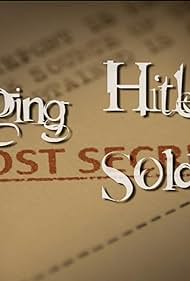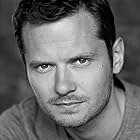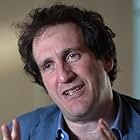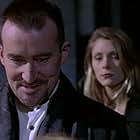An examination of British Intelligence's World War II systematic eavesdropping on German prisoners of war.An examination of British Intelligence's World War II systematic eavesdropping on German prisoners of war.An examination of British Intelligence's World War II systematic eavesdropping on German prisoners of war.
Photos
Gareth Keiran Jones
- Fried
- (as Gareth Kieran Jones)
Storyline
Featured review
The British send German POW officers to country estates and provide comfortable, if not luxurious accommodations. No bars on the windows or doors, even the occasional trip into town. Did anyone try to escape? No mention of that. But how far would someone speaking German get in Britain in wartime? The Germans never seem to have suspected an ulterior motive behind this British hospitality. And the real reason was kept secret for decades, past the end of the Cold War.
The Brits wired ever inch of the estate for sound: bedrooms, lounges, bathrooms, even trees. In the basement and attics were agents tracking their movements, recording every word they said on disks, then transcribing and translating thousands of conversations.
What did they want? They wanted information. Now, if it was the Bush Administration, they would have simply tortured them, water-boarded them, no subtlety but very patriotic. Me, I would have had them listen to The Rolling Stones and eat McDonald's happy meals 24 hours a day; now that's torture. But no one asked me.
Information. Information about German military plans, such as activities in Peenemünde to build rockets capable of hitting America, Hitler's state of mind, the response to assassination attempts. They also got candid conversations among soldiers and officers about the rape and mass killing of civilians and Jews, in other words, genocide and war crimes. And, yes, regular German soldiers participated, sometimes in their off hours, sometimes just for fun.
Yet, these conversations were not used in the prosecution of war crimes, as was originally planned. Why not? The project was such a success the British felt it was more important to keep it secret, for use during the Cold War against Russians, etc. Did they use it, and how, during the subsequent decades? Ah, that part it seems is still secret, for the documentary does not say.
Let's see, monitor every word people say, put prisoners in luxurious surroundings and let them talk, sometimes with plants posing as prisoners to loosen their tongues.
What does this bring to mind? George Orwell's Nineteen Eighty-Four, and Patrick McGoohan's The Prisoner. In 1984, the focus was on ubiquitous bugging. In The Prisoner there was also comprehensive audio and visual monitoring of prisoners in a resort setting, The Village, with various scenarios to trick No. 6 into talking.
Had Orwell and McGoohan heard about the secret British prisoner monitoring? With operations of this size, word may have gotten around in some circles. But this documentary makes no mention of these implications, even though the technique has been declassified. Who knows? The re-enactments in the documentary are first-rate, with actors reading verbatim translations of conversations by Germans. It also shows Brits setting up the equipment, wiring everything for sound, installing super-sensitive microphones of an unspecified nature (condenser ribbon microphones?). More information about the equipment would have been interesting.
Another possible consequence of this technique is that Britain seems to have more surveillance microphones and cameras set on the general public per capita than any other country. Was this a natural extension of their secret monitoring technology developed during WWII and the Cold War? Perhaps the companies making the secret equipment helped sell the idea for general use?
The Brits wired ever inch of the estate for sound: bedrooms, lounges, bathrooms, even trees. In the basement and attics were agents tracking their movements, recording every word they said on disks, then transcribing and translating thousands of conversations.
What did they want? They wanted information. Now, if it was the Bush Administration, they would have simply tortured them, water-boarded them, no subtlety but very patriotic. Me, I would have had them listen to The Rolling Stones and eat McDonald's happy meals 24 hours a day; now that's torture. But no one asked me.
Information. Information about German military plans, such as activities in Peenemünde to build rockets capable of hitting America, Hitler's state of mind, the response to assassination attempts. They also got candid conversations among soldiers and officers about the rape and mass killing of civilians and Jews, in other words, genocide and war crimes. And, yes, regular German soldiers participated, sometimes in their off hours, sometimes just for fun.
Yet, these conversations were not used in the prosecution of war crimes, as was originally planned. Why not? The project was such a success the British felt it was more important to keep it secret, for use during the Cold War against Russians, etc. Did they use it, and how, during the subsequent decades? Ah, that part it seems is still secret, for the documentary does not say.
Let's see, monitor every word people say, put prisoners in luxurious surroundings and let them talk, sometimes with plants posing as prisoners to loosen their tongues.
What does this bring to mind? George Orwell's Nineteen Eighty-Four, and Patrick McGoohan's The Prisoner. In 1984, the focus was on ubiquitous bugging. In The Prisoner there was also comprehensive audio and visual monitoring of prisoners in a resort setting, The Village, with various scenarios to trick No. 6 into talking.
Had Orwell and McGoohan heard about the secret British prisoner monitoring? With operations of this size, word may have gotten around in some circles. But this documentary makes no mention of these implications, even though the technique has been declassified. Who knows? The re-enactments in the documentary are first-rate, with actors reading verbatim translations of conversations by Germans. It also shows Brits setting up the equipment, wiring everything for sound, installing super-sensitive microphones of an unspecified nature (condenser ribbon microphones?). More information about the equipment would have been interesting.
Another possible consequence of this technique is that Britain seems to have more surveillance microphones and cameras set on the general public per capita than any other country. Was this a natural extension of their secret monitoring technology developed during WWII and the Cold War? Perhaps the companies making the secret equipment helped sell the idea for general use?
Details
- Release date
- Country of origin
- Official site
- Language
- Also known as
- Bugging Hitler's Soldiers on Secrets of the Dead
- Production company
- See more company credits at IMDbPro
- Runtime54 minutes
Contribute to this page
Suggest an edit or add missing content








